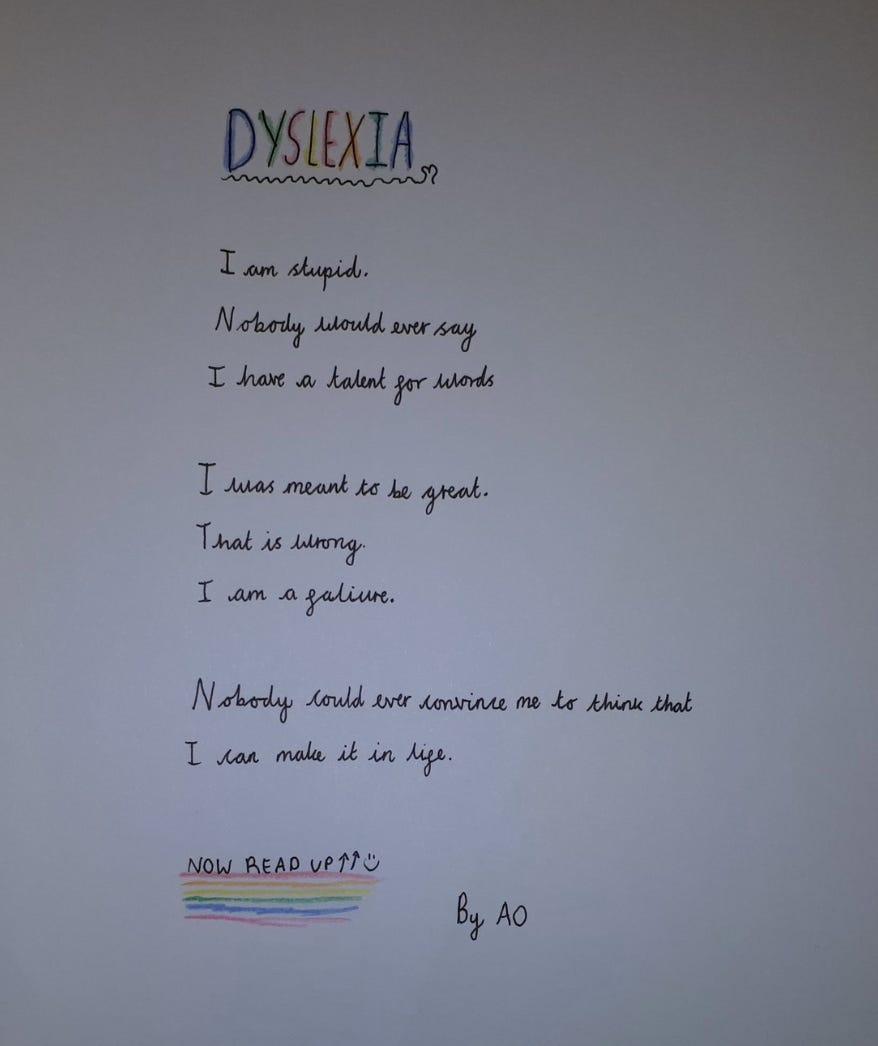Small Talks, No. 103
Friday, October 25, 2025
Welcome to the 103rd edition of Small Talks. Every Friday, I highlight 6 areas of weekly joys and reflections in early childhood and the whole family. Small Talks leverages my experience at the intersection of education, philanthropy, and impact investing. Enjoy!
What I’m celebrating -
October is Dyslexia Month.
Did you know?
Prevalence. Dyslexia is estimated to affect approximately 10-20% of people worldwide, though many cases remain undiagnosed or misdiagnosed.
Creative Leaders. About 35% of entrepreneurs are dyslexic, highlighting a connection between dyslexia, creativity, and leadership. It is estimated that dyslexics are 50% of NASA rocket scientists and 40% of self-made millionaires.
Overlapping Conditions: Around 30% of individuals with dyslexia also have ADHD, creating both challenges and opportunities for unique cognitive strengths.
Gender Differences. While boys are more often diagnosed, research shows dyslexia affects boys and girls equally. Girls may be under-diagnosed due to subtler symptoms.
Undiagnosed Potential: 30-50% of prison inmates are estimated to have dyslexia, and 35% of dyslexics drop out of high school, emphasizing the importance of early intervention to change life outcomes.
Some hope.
Innovators like Stanford ROAR (Rapid Online Assessment for Reading), EarlyBird Education, Marker Learning, and Dysolve are building early assessment tools for educators and parents. These tools are both scalable and affordable.
Could AI make a difference? Please read more here.
What I’m listening to -
Made By Dyslexia, led by Kate Griggs, is reframing dyslexia as a strength and advocating for better support through awareness, training, and partnerships. Please tune in to their podcast here. Also I appreciated Made by Dyslexia’s latest report: “Intelligence 5.0: A New School of Rethinking The Intelligence Needed in Industry 5.0."
What I’m reading -
The Dyslexic Advantage: Unlocking the Hidden Potential of the Dyslexic Brain by Eide Brock and Eide Fernette Eide emphasizes the strengths and unique cognitive skills associated with dyslexia, shifting the focus from challenges to the hidden advantages that dyslexic individuals often possess.
Fish in a Tree by Lynda Mullaly Hunt is a middle-grade novel about a young girl who hides her dyslexia, only to thrive once a teacher recognizes her potential.
What I’m watching -
Neural Plasticity in Developmental Dyslexia by my colleague Stanford Professor Jason Yeatman.
Who wouldn’t benefit from an inspiring, beautifully illustrated cartoon to explain dyslexia. The Boy With His Head in the Clouds? offers an empowering way to understand dyslexia, capturing its challenges while celebrating the unique strengths that often come with it.
What I’m learning more deeply from the latest research -
Early Detection with Neuroimaging. Research from Harvard’s Gaab Lab shows that brain differences linked to dyslexia can be identified in the early years, long before third grade. This supports early intervention efforts, moving away from the traditional reactive “wait-to-fail” approach in education. Read more here.
Genetics and Personalized Interventions. Genetic studies are identifying specific gene variants associated with dyslexia and exploring how these genes interact with environmental factors like early language exposure. Read more here.
Technology-Enhanced Screening. Advances in technology are making dyslexia screening more precise and accessible. New tools integrate digital platforms for engaging assessments, giving educators real-time data to customize support. These developments enhance early identification and improve intervention outcomes. Read more about three recent research here in EdWeek.
Some mixed results from multi-sensory interventions in Hechinger Report.
Poem I’m pondering -
A 10-year-old girl’s reverse poem, "Dyslexia," went viral some time ago. When read top to bottom, it feels disheartening, but in reverse, it becomes empowering. Her teacher, Jane Broadis, shared it on social media, earning widespread praise.
Feedback is a gift. Which part above is your favorite? What did I miss? What do you want more or less of? Other recommendations? Please kindly let me know. Thank to all of you who are sending me amazing suggestions.
If you enjoy this newsletter, please help spread the word by sharing with your friends, colleagues, and networks.
✨ Unlock the power of relationships in learning. Thanks for your help in spreading the word about my upcoming book "Love to Learn: The Transformative Power of Care and Connection in Early Education" with your community and spark conversations about how care, connection, and relational intelligence can transform education and unlock human potential. The book is available for pre-order and will be published on February 11, 2025. 📚❤️
Have a wonderful week. Please stay safe and care for each other.
Isabelle






Love this edition and its dedication to a topic we really don't discuss enough. One of my favorite reads of all time is a book called Copy This! by Paul Orfalea. If you have not read, I highly recommend! Paul's story takes place long before anyone was talking about dyslexia and his journey is inspiring!